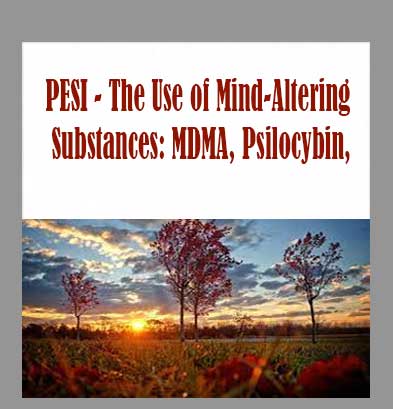
Description
PESI – The Use of Mind-Altering Substances: MDMA, Psilocybin, and Marijuana for Treating PTSD and Other Mental Distress download, PESI – The Use of Mind-Altering Substances: MDMA, Psilocybin, and Marijuana for Treating PTSD and Other Mental Distress review, PESI – The Use of Mind-Altering Substances: MDMA, Psilocybin, and Marijuana for Treating PTSD and Other Mental Distress free
PESI – The Use of Mind-Altering Substances: MDMA, Psilocybin, and Marijuana for Treating PTSD and Other Mental Distress
The Use of Mind-Altering Substances: MDMA, Psilocybin, and Marijuana for Treating PTSD and Other Mental Distress
Speakers: Michael Mithoefer, MD | Bessel A. van der Kolk, MD | Richard C. Schwartz, PhD | William Richards, Ph.D. | Daniel McQueen, MA | James W. Hopper, PhD | Anne St. Goar, MD | Elizabeth Call, PsyD | Francis Guerriero, MA, LICSW | Michael Alpert, MD | Phil Wolfson, MD
Duration: 6 Hours 28 Minutes
Format: Audio and Video
Description
For the first time in over four decades, researchers are returning to examining the therapeutic benefits of mind altering substances, including MDMA (ecstasy), psilocybin (mushrooms), marijuana and LSD.
In the 1970s the study of all psychedelics was criminalized in the US, despite emerging evidence of their medical value. Over the past decade, the Multidisciplinary Association for Psychedelic Research (MAPS) has helped to revive psychedelic research, sponsoring studies across the United States and around the world, including MDMA-assisted therapy for PTSD, and end-of-life anxiety. The results have been very positive, lasting over 72 months of follow-up, with few adverse effects.
Psychedelics may promote a deepening and acceleration of the psychotherapeutic process. During therapy, people often are able to access and find peace with disavowed, “exiled” parts of themselves.
In this workshop recording the founder of MAPS will describe the evolution of psychedelic therapy, the principal investigator of the Phase I and II level trials will discuss outcomes and processes, the PI of the Hopkins psilocybin study terminally ill patients and a marijuana researcher the promises and pitfalls for that substance. The Boston MDMA study team will discuss clinical experiences and applications.
In appropriate therapeutic contexts, psychedelics may prove to be more effective than most conventional treatments, as well as safer and more cost-effective.
Speakers
Michael Mithoefer, MD
Michael Mithoefer, MD, clinical assistant professor of psychiatry at the Medical University of South Carolina. In 2009, he completed & published the first FDA approved clinical trial of MDMA assisted psychotherapy for treatment-resistant PTSD, followed by completion of a Phase II trial. He is overseeing a multisite Phase III study of MDMA-assisted psychotherapy in 13 sites around the US (including the Trauma Research Foundation), and another MDMA-assisted psychotherapy multisite study in Europe and Israel.
Speaker Disclosures:
Financial: Dr. Michael Mithoefer has employment relationships with Bassett Healthcare Network, Medical University of South Carolina, and MAPS Public Benefit Corporation. He has an ownership interest in Awakn Life Sciences and serves on the scientific advisory board. Dr. Mithoefer receives a speaking honorarium and recording royalties from PESI, Inc.
Non-financial: Dr. Michael Mithoefer is a fellow of the American Psychiatric Association.
Bessel A. van der Kolk, MD
Trauma Research Foundation
Bessel A. van der Kolk, MD, is a clinician, researcher and teacher in the area of post-traumatic stress. His work integrates developmental, neurobiological, psychodynamic and interpersonal aspects of the impact of trauma and its treatment.
Dr. van der Kolk and his various collaborators have published extensively on the impact of trauma on development, such as dissociative problems, borderline personality and self-mutilation, cognitive development, memory, and the psychobiology of trauma. He has published over 150 peer-reviewed scientific articles on such diverse topics as neuroimaging, self-injury, memory, neurofeedback, Developmental Trauma, yoga, theater, and EMDR.
He is founder of the Trauma Center in Brookline, Massachusetts and President of the Trauma Research Foundation, which promotes clinical, scientific, and educational projects.
His 2014 #1 New York Times best seller, The Body Keeps the Score: Brain, Mind, and Body in the Treatment of Trauma, transforms our understanding of traumatic stress, revealing how it literally rearranges the brain’s wiring – specifically areas dedicated to pleasure, engagement, control, and trust. He shows how these areas can be reactivated through innovative treatments including neurofeedback, somatically based therapies, EMDR, psychodrama, play, yoga, and other therapies.
Dr. van der Kolk is the past president of the International Society for Traumatic Stress Studies, and professor of psychiatry at Boston University Medical School. He regularly teaches at conferences, universities, and hospitals around the world.
Speaker Disclosures:
Financial: Dr. Bessel van der Kolk is a professor at Boston University School of Medicine, the Director of the Trauma Center, and the National Complex Trauma Network. He receives royalties as a published author. Dr. van der Kolk receives a speaking honorarium, recording royalties, and book royalties from PESI, Inc. He has no relevant financial relationships with ineligible organizations.
Non-financial: Dr. Bessel van der Kolk has no relevant non-financial relationships with ineligible organizations.
Richard C. Schwartz, PhD
IFS Institute
Richard Schwartz, PhD began his career as a family therapist and an academic at the University of Illinois at Chicago. There he discovered that family therapy alone did not achieve full symptom relief, and in asking patients why, he learned that they were plagued by what they called “parts.” These patients became his teachers as they described how their parts formed networks of inner relationship that resembled the families he had been working with. He also found that as they focused on and, thereby, separated from their parts, they would shift into a state characterized by qualities like curiosity, calm, confidence and compassion. He called that inner essence the Self and was amazed to find it even in severely diagnosed and traumatized patients. From these explorations, the Internal Family Systems (IFS) model was born in the early 1980s.
IFS is now evidence-based and has become a widely-used form of psychotherapy, particularly with trauma. It provides a non-pathologizing, optimistic, and empowering perspective and a practical and effective set of techniques for working with individuals, couples, families, and more recently, corporations and classrooms.
In 2013, Schwartz left the Chicago area and now lives in Brookline, MA where he is on the faculty of the Department of Psychiatry at Harvard Medical School.
Speaker Disclosures:
Financial: Dr. Richard Schwartz is the Founder and President of the IFS Institute. He maintains a private practice and has a employment relationship with Harvard Medical School. He receives royalties as a published author. Dr. Schwartz receives a speaking honorarium, recording, and book royalties from Psychotherapy Networker and PESI, Inc. He has no relevant financial relationships with ineligible organizations.
Non-financial: Dr. Richard Schwartz is a fellow of Meadows Behavioral Healthcare and is a member of the American Family Therapy Academy and the American Association for Marital and Family Therapy. He is a contributing editor for Family Therapy Networker. Dr. Schwartz serves on the editorial boards for the Journal of Feminist Family Therapy, the Contemporary Family Therapy, the Journal of Family Psychotherapy, and the Family Therapy Collections.
William Richards, Ph.D.
William Richards, Ph.D., Psychologist, Johns Hopkins Bayview Medical Center where he is co-director of the program in psilocybin for terminally ill cancer patients. Contributor Fantastic Fungi.
Daniel McQueen, MA
Daniel McQueen, MA, Psychedelic therapist and executive director of Medicinal Mindfulness. Author of Cannabis-Assisted Psychedelic Therapy for Trauma Resolution.
James W. Hopper, PhD
James W. Hopper, PhD, Independent consultant and Instructor in Psychology, Cambridge Health Alliance & Harvard Medical School. Co-editor, Mindfulness-Oriented Interventions for Trauma: Integrating Contemplative Practices. The MDMA Team, Trauma Research Foundation.
Speaker Disclosures:
Financial: James Hopper maintains a private practice and has employment relationships with Harvard University and Cambridge Health Alliance. He is a sub-investigator and therapist with MAPS/MPBC and The Trauma Research Foundation. James Hopper receives royalties as a published author. He receives a speaking honorarium and recording royalties from PESI, Inc. He has no relevant financial relationships with ineligible organizations.
Non-financial: James Hopper serves on the advisory board for Callisto. He is a member of the International Society for Traumatic Stress Studies and the APA Division 56. James Hopper is an Ad hoc reviewer for several peer review journals, for a complete list contact PESI, Inc.
Anne St. Goar, MD
Anne St. Goar, MD, Primary care physician at HVMA, emeritus certified psychedelic therapist; Boston MDMA Therapy team member with the Trauma Research Foundation.
Elizabeth Call, PsyD
Elizabeth Call, PsyD, Psychologist in private practice. Therapy team member, MDMA study, the Trauma Research Foundation.
Speaker Disclosures:
Financial: Dr. Elizabeth Call maintains a private practice, is the co-founder of Burma Border Projects, and has employment relationships with EMDR International Association and EMDR Institute. She is a sub-investigator for FDA phase III trials of MDMA-assisted psychotherapy sponsored by MAPS/MPBC and The Trauma Research Foundation. Dr. Call receives a speaking honorarium and recording royalties from PESI, Inc. She has no relevant financial relationships with ineligible organizations.
Non-financial: Dr. Elizabeth Call is a member of the EMDR International Association and the Massachusetts Psychological Association.
Francis Guerriero, MA, LICSW
Francis Guerriero, MA, LICSW, Private practice, Cambridge, MA; MDMA Therapy team member, The Trauma Research Foundation.
Speaker Disclosures:
Financial: Francis Guerriero maintains a private practice and has an employment relationship with the Trauma Research Foundation. He receives a speaking honorarium and recording royalties from PESI, Inc. He has no relevant financial relationships with ineligible organizations.
Non-financial: Francis Guerriero has a professional relationship as a therapist and sub-investigator under Multidisciplinary Association for Psychedelic Studies (MAPS).
Michael Alpert, MD
Michael D. Alpert, MD, Staff Psychiatrist, BayCove Mental Health Center, Boston Harvard Medical School; MDMA Therapy team member, the Trauma Research Foundation.
Speaker Disclosures
Financial: Dr. Michael Alpert maintains a private practice and has employment relationships with Quincy Asian Resources Initiative, Baystate Health, MAPS Public Benefit Corporation, Harvard Medical School and Cambridge Health Alliance. He receives a speaking honorarium and recording royalties from PESI, Inc. He has no relevant financial relationships with ineligible organizations.
Non-financial: Dr. Michael Alpert is a member of the American Psychiatric Association and the Massachusetts Medical Society.
Phil Wolfson, MD
Phil Wolfson, MD, is president and CEO of the non-profit Ketamine Research Foundation and directs the training of KAP practitioners through The Ketamine Training Center. Phil’s book, The Ketamine Papers, is the seminal work in the burgeoning ketamine arena. His is principal investigator for the MAPS sponsored Phase 2, the FDA-approved 18-person study of MDMA-Assisted Psychotherapy for individuals with significant anxiety due to life threatening illnesses. His clinical practice with ketamine has informed his leadership role in the development of Ketamine-Assisted Psychotherapy.
Speaker Disclosures:
Financial: Philip Wolfson is the founder and CEO of The Ketamine Research Foundation. He has an ownership interest in Progressive Therapeutics, Inc. Dr. Wolfson will address off-label uses. He has no relevant financial relationships with ineligible organizations.
Non-financial: Philip Wolfson has no relevant non-financial relationship to disclose.
Objectives
- Discuss the emerging research of MDMA-Assisted Psychotherapy (MDMA-AP) and describe effective ways of integrating it into ongoing psychotherapy to improve clinical outcomes for clients with PTSD.
- Examine the history and contemporary research of Psilocybin and evaluate the effectiveness of Psilocybin-Assisted Psychotherapy (PAP) in facilitating psychotherapy.
- Communicate the ongoing work with Ketamine-Assisted Psychotherapy (KAP) and synthesize methods of integration of psychedelic-assisted therapy in contemporary treatment for mental illness.
- Distinguish different types of Cannabis and ways that it can be used in psychotherapy, including Psychedelic Cannabis-Assisted Psychotherapy (CAP), and summarize current research on Cannabis Sativa and its variations.
- Consider the similarities and differences between each of the psychedelic drugs, and evaluate the potential for integration with modern psychotherapy.
- Consider the advantages, risks, and adverse effects of psychedelic drugs and support the possibilities for future research.
Outline
Introduction
MDMA
- History of MDMA
- Pharmacology of MDMA
- Controlled Clinical Trials since Scheduling
- Therapeutic Method Used in Clinical Trials
Psilocybin
- Languages and Cognitive Frameworks for Discussing Psychedelics
- History of Psilocybin
- Recent Clinical Research with Psilocybin
- Therapeutic Method Used in Clinical Trials
Ketamine
- General Practices of Ketamine Assisted Psychotherapy
- Recent Clinical Research with Ketamine
- History of Ketamine
- The Psychedelic Toolbox
Cannabis
- Cannabis Overview
- Current Cannabis Research
- Cannabis Assisted Psychedelic Therapy
- Case Study and Conclusion
- Need for Further Research
Discussion on the Integration of Psychedelic-Assisted Therapy
Q&A Panel with Presenters
Q&A Panel with MAPS MDMA Therapy Team
Target Audience
- Social Workers
- Counselors
- Psychologists
- Physicians
- Psychiatrists
- Addiction Counselors
- Marriage & Family Therapists
- Occupational Therapists
- Occupational Therapy Assistants
- Nurses
- Other Mental Health Professionals
The Use of Mind-Altering Substances: MDMA, Psilocybin
Frequently Asked Questions:
- Innovative Business Model:
- Embrace the reality of a genuine business! Our approach involves forming a group buy, where we collectively share the costs among members. Using these funds, we purchase sought-after courses from sale pages and make them accessible to individuals facing financial constraints. Despite potential reservations from the authors, our customers appreciate the affordability and accessibility we provide.
- The Legal Landscape: Yes and No:
- The legality of our operations falls into a gray area. While we lack explicit approval from the course authors for resale, there’s a technicality at play. When procuring the course, the author didn’t specify any restrictions on resale. This legal nuance presents both an opportunity for us and a boon for those seeking budget-friendly access.
- Quality Assurance: Unveiling the Real Deal:
- Delving into the heart of the matter – quality. Acquiring the course directly from the sale page ensures that all documents and materials are identical to those obtained through conventional means. However, our differentiator lies in going beyond personal study; we take an extra step by reselling. It’s important to note that we are not the official course providers, meaning certain premium services aren’t included in our package:
- No coaching calls or scheduled sessions with the author.
- No access to the author’s private Facebook group or web portal.
- No entry to the author’s exclusive membership forum.
- No direct email support from the author or their team.
We operate independently, aiming to bridge the affordability gap without the additional services offered by official course channels. Your understanding of our unique approach is greatly appreciated.
- Delving into the heart of the matter – quality. Acquiring the course directly from the sale page ensures that all documents and materials are identical to those obtained through conventional means. However, our differentiator lies in going beyond personal study; we take an extra step by reselling. It’s important to note that we are not the official course providers, meaning certain premium services aren’t included in our package:
Refund is acceptable:
- Firstly, item is not as explained
- Secondly, Item do not work the way it should.
- Thirdly, and most importantly, support extension can not be used.
Thank you for choosing us! We’re so happy that you feel comfortable enough with us to forward your business here.








Reviews
There are no reviews yet.